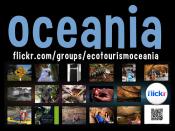What future does ecotourism have?
Tourism can be defined as a type of consumerism, the extent to which environmental considerations influence buying behaviour is likely to have a major influence on how tourism interacts with the natural environment. Ecotourism on the other hand is defined as "responsible travel to natural areas that conserves the environment and improves the well-being of local people" (TIES, 1990). The philosophy of ecotourism is the respect for land, nature, people and cultures and it tries to promote tourism products with an environmental emphasis. For ecotourism to be successful it should be sustainable (defined as meeting present needs without compromising the ability to meet future needs), Maintain quality of environment and give visitors a unique experience (Wight 1994).
By the end of the 20th Century Green consumerism and the purchasing of environmentally friendly products had become a significant niche market and it continued in the first decade of the 21st century (Andrew Holden: 2008).
For instance in 1988 a survey suggested that 19% of people prefer environmentally friendly products and the same survey was taken in 1996 in which 36% of the people prefered environmentally friendly goods (Martin 1997). This continues to show that the mindset of the consumers and how they are slowly moving towards more eco-friendly products.
This influence of green consumerism upon the tourism market is not easy to discern. Swarbrooke and Horner (1999) suggested that green tourist has not achieved the acceptance that the phrase green consumer has. This does not mean consumers don't care about the tourism industry, but means that they don't rank tourism as much of a problem on the environment. A survey done in 1995 by the MORI in the UK suggested that 64% of the people thought tourism damages the environment. On the same survey when they...


